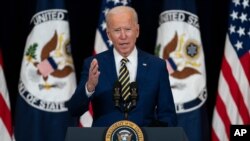President Joe Biden is set to end U.S. support for the Saudi-led military offensive in Yemen, national security adviser Jake Sullivan announced Thursday.
Instead, the U.S. hopes to end the five-year war in the Arabian peninsula’s poorest country through diplomacy, with Biden naming a career diplomat, Timothy Lenderking, as a special envoy to Yemen.
Saudi Arabia began the offensive in 2015 against a Houthi faction that had seized territory in Yemen and had begun launching cross-border missiles at Saudi Arabia. Riyadh responded with an air campaign that has killed large numbers of civilians, with survivors displaying parts of weapons that showed they were made in the United States.
The conflict has added to the hunger and poverty in Yemen.
Biden’s ending of U.S. support for the Saudi military offensive would fulfill a campaign promise. He is expected to announce the move during a visit to the State Department Thursday afternoon.
Watch the president's speech:
In his first major foreign policy address, Biden plans to spell out his intent to re-engage the U.S. in world affairs and upend former President Donald Trump’s “America First” credo, which often saw Trump quarreling with traditional U.S. allies while showing warmth toward authoritarian rulers.
According to excerpts of the speech released by the White House, Biden is promising to strengthen relationships with U.S. allies, saying they have “atrophied from four years of neglect and abuse” under Trump.
Biden plans to argue that diplomacy should be at the heart of America’s foreign policy.
“Over the past two weeks, I’ve spoken with the leaders of many of our closest friends — Canada, Mexico, the UK, Germany, France, NATO, Japan, South Korea, and Australia
— to begin reforming the habits of cooperation and rebuilding the muscles of democratic alliances” that Trump weakened, Biden plans to say.
“America’s alliances are among our greatest assets,” Biden declares. “And leading with diplomacy means standing shoulder to shoulder with our allies and key partners once more.”
Biden also spoke to State Department employees, telling them, “This administration is going to empower you to do your jobs, not target or politicize you. We want a rigorous debate, that brings in all perspectives, and makes room for dissent. That’s how we’ll get the best possible policy outcomes.”
Sullivan told reporters that Biden’s address is aimed at sending “a clear message that our national security strategy will lead with diplomacy."
Biden was not expected to outline the specifics of a new approach to foreign adversaries, including China, North Korea, Russia and Iran.
China
But new Secretary of State Anthony Blinken told reporters last week the relationship between the U.S. and China is “arguably the most important relationship that we have in the world going forward.”
Biden’s Thursday speech comes as the U.S. ponders a new approach to China, which officials have said includes a policy of “strategic patience.”
How to handle supply chain and intelligence threats from China is among the top priorities of the Biden administration. It has been reported that Biden is soon expected to sign an executive order to review U.S. supply chains, with a focus on coronavirus relief suppliers from foreign competitors.
"We know that China is engaged in a range of conduct that hurts American workers,” State Department spokesman Ned Price said this week. “It blunts our technological edge, it threatens our alliances and influence in international organizations, and China is engaged in gross human rights violations that shock the conscience.”
“So, we will counter China’s aggressive and coercive actions, sustain our key military advantages, defend democratic values, invest in advanced technologies, and restore our vital security partnerships,” he added.
Biden has spoken by phone with several foreign leaders since taking office, including traditional U.S. allies and Russian President Vladimir Putin.
During that call, the White House says Biden raised contentious issues such as the arrest of opposition figure Alexey Navalny, as well as Moscow’s cyber-espionage campaign, while seeking common ground by agreeing to extend a landmark nuclear arms deal with Russia that was about to expiring.
On Wednesday, the U.S. and Russia announced they had extended the New START arms control treaty for five years, pursuing arms control between the world’s two largest strategic nuclear arsenals.
“We remain clear-eyed about the challenges that Russia poses to the United States and the world," Blinken said in a statement.
He added that the U.S. will “work to hold Russia to account for adversarial actions as well as its human rights abuses, in close coordination with our allies and partners.”





